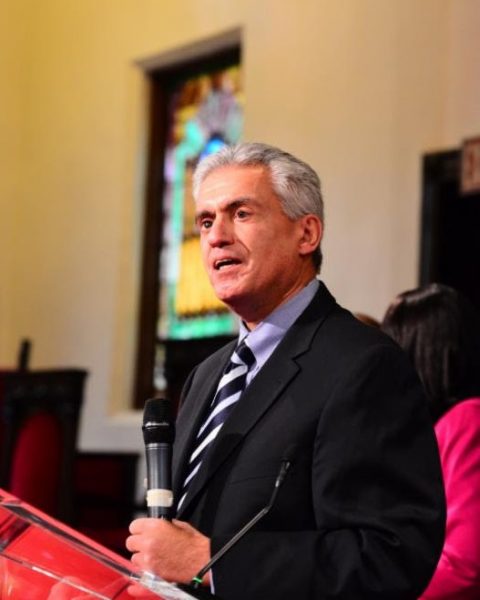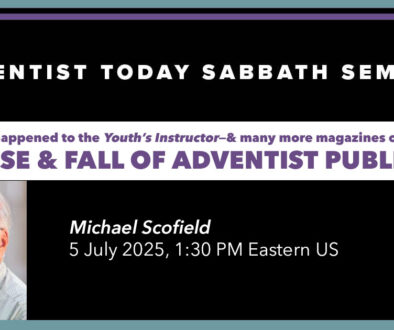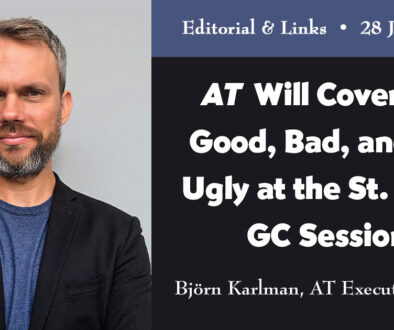Tony Romeo Leaves the Church
By Debbonnaire Kovacs, 4-13-17 [Editor’s note: This story was originally posted June 2012. I am reprinting for those who read this week’s feature and want to know more about Tony. DLK]

REACH-NYC
Historic Manhattan Seventh-day Adventist Church
“I’ve decided to leave the church. Please join me.”
So reads an invitational email promoting Pastor Tony Romeo’s new venture, called “Reach NYC.” After forty years in the marketing and publicity business, Romeo knows that something provocative, even controversial, gets interest. And he believes there could be a lot more interest in the Seventh-day Adventist church.
He is not, of course, leaving either the denomination or his employment in it. He does believe that it’s long past time the church members get out of their pews and go to their neighbors as Jesus did, even if it means being criticized (as Jesus was). He feels that the church is too closed in its outreach—“sexual orientation, for one. The world is much more advanced than we are when it comes to loving and accepting people. People hate me because I accept the gay community,” Romeo said. He told the story of a young gay man who had somehow heard of Romeo, and called him from California. The young man asked, “If I come to your church, will you love me?”
Romeo did end up parting ways with one congregation in New York City on just this issue. He preached (“I thought my church was a safe zone,”) that Christians should love gay people, and got in trouble. He loved his church and was part of the team that encouraged its growth from 50 to 230, in part because young people started coming, but he resigned when he and the board had what they felt were irreconcilable differences. He says that the New York Conference is very supportive of what he is trying to do, and have kept him employed. He is pastor of Manhattan Seventh-day Adventist Church, in Greenwich Village, and is also trying to keep a small congregation going at a place he renamed the Chapel at Union Square.
It is Romeo’s passionately expressed belief that this denomination could be much better known, if only church leaders at every level would work together instead of individually, be willing to push the envelope, and be what he calls “opportunistic” in outreach.
“We have all these great programs, but who knows besides us?” He mentioned schools that are struggling and closing, yet studies show that “we develop wonderful students. Why not develop an advertising program that shows why our system is great?” Newsweek did a story (link)—in which they listed things you should do to be healthy. Number one on the list was “be born a woman.” Number two was “become a Seventh-day Adventist.” Romeo said, “Coke or Pepsi, if they were given that kind of exposure, would use a ton of money right that minute and ride the wave. That’s what I mean by opportunistic. Why don’t we do that? Why aren’t we rising up in New York and working with Mayor Bloomberg, who wants to ban soft drinks larger than 16 ounces? We wouldn’t necessarily agree with his ban, but we could ‘ride that wave’ and talk about health and that all soft drinks are a bad idea.” Romeo mentioned a Harvard study that says “sabbathing” is important, Link the report on so-called “blue zones”, the abuse in Catholic church, and health movies like Supersize Me as opportunities we’ve missed for ways to work together with people in the world who are trying to improve things. In other words, he said, we would definitely not criticize or abuse Catholic clergy or obese people or over-worked people, but would try to find ways to help.
And we’d get our name known in the process. “Brand it, and use it everywhere. Non-publicity will kill any organization,” Romeo maintains. He says Adventist roots are in advertising—that they used every tool they had in communicating God’s message through written ministry, for example, and that J. N. Andrews’ first act in Europe was to put an ad in the paper. They were working at the forefront of available technology. All we do now is copy their 19th century techniques, when today we could still be at the forefront of available technology. He wishes all the pastors in a given city or community would sit down together and create a consolidated plan to reach their city or community, using every gift in the group and every means in their reach.
He began his outreach ministry, Reach NYC (link) with the intention of taking the great news of God’s all-inclusive love to the inner city, exactly as denominational leadership has preached for years. This entity is a 501(c)(3) non-profit so that it could be approved by the New York Attorney General and can receive tax-deductible donations. Romeo says they believe in functioning in a disciplined and business-like fashion, and since they have only a three-member board, they can make decisions quickly and get things done.
For example, when they needed chairs and tables in a hurry for a local project, they got them in days. At an Adventist Book Center ideally located for heavy traffic, Reach NYC “took over the lobby.” They told the ABC, “We’ll buy and set up tables, you display your books all week, then once a week we’ll have lectures and once a month, cooking classes.” They bought the hot plates and other needs for the classes, too. They had fifteen to thirty people at their Friday night lectures and thirty to forty at the monthly cooking classes. He says the best-attended things they do are health-related, and that 40% of attendees are non-Adventist.
Romeo also believes that sharing is a two-way road. We can learn from many people and sources besides those provided within the church. He is taking courses at the Blanton-Teale Institute that have helped him “hugely” in understanding and counseling people and their enormous inner burdens. He believes every Christian, especially pastors, should seek a deep knowledge of the individual, as Jesus did. Jesus’ most profound teaching, in Romeo’s view, was, Judge not. “That’s a terrible sin.”
Some pastors are really leaving the church because they perceive it as staying the same as it was in the 1800s, and Romeo says he understands the temptation sometimes. “But where am I going to go? Do I go to [different local churches]?” He decided not to, in part because of memories of his childhood church. “If it had not been for the Bronx Italian SDA church where I was raised, where there were people who came to my dad’s funeral—ladies came and filled bathtub with ice and brought enough food for the family for five days! They kept me in the church today and when I do something for God and get criticized, I see their faces. But I ended up starting my own thing because I’m so hungry.”
He sees other pastors doing the same thing. It could be said that Adventist Today falls into this category. “We are the voices that are trying to keep the church from dying. It’s dying today,” Romeo says. “We have a precious message—and it’s not even our message, it’s the message of Jesus! At the end of the day, all you need to win people to Jesus is a loaf of bread, a cup of soup, and a smile.”
Romeo pauses, then repeats that: “A loaf of bread, a cup of soup, and a smile.”




